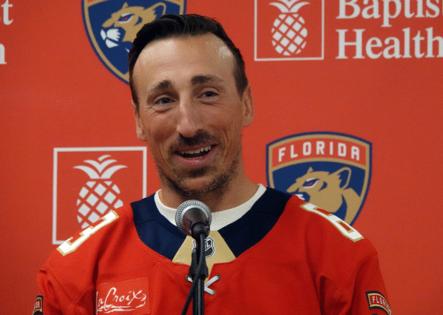Dave Hyde: Panthers' Brad Marchand didn't expect to return -- then Florida's little helper appeared
Published in Hockey
FORT LAUDERDALE, Fla. — Brad Marchand told our sports market’s dirty, little, wonderful secret. It’s one that, as former Miami Dolphins executive Mike Tannenbaum said, “We brought up all the time when negotiating.” It’s a “possible game-decider if everything else is equal,’’ a long-time agent said.
It’s why Marchand says he re-signed with the Florida Panthers despite never expecting to do so.
“I honestly didn’t think there was a chance of it happening,’’ he said. “I didn’t expect to be a Panther this year.”
He loved the team, the larger organization and especially the chance to chase Stanley Cups for the final years of his career. But after winning the title last June and hitting free agency, he thought what most everyone thought: The Panthers didn’t have the salary-cap money to sign him and fellow free agents Sam Bennett and Aaron Ekblad.
Even when general manager Bill Zito called to start that exact process, Marchand said he was “ecstatic,” but doubtful.
“I’m a realistic person,’’ he said. “When I looked at it and looked at the cap position, I didn’t think it was possible.”
Enter our front-office version of Tush Push, a book-keeping force that can get the final yard in a deal: Florida’s lack of a state income tax.
“If we were not in a non-tax state, it probably wouldn’t have worked out for two guys — two guys probably would’ve been leaving in that situation,’’ Marchand said. “So that’s a benefit this team has that we were able to utilize and make work.”
It’s a benefit in every South Florida sport to some degree. How much? Maybe right there with wearing flip flops or visiting the beach. It also depends on how deeply you want to dive into the math. For instance, players must pay taxes in every city they play a game, meaning only the home half of the schedule gets a Florida tax-free ride.
“We brought it up all the time,’’ said Tannenbaum, who ran the Dolphins from 2015 to 2019. “We thought the overall South Florida offering of no state income tax, the weather, great places to live — shame on us if we don’t lean into that.”
It mattered if a free agent was considering another team in a no-tax state such as Texas, Washington or Tennessee, he said.
“If it was against a Northeast team, it could be a dramatic difference (in taxes),’’ Tannenbaum said. “It’d be like, ‘Hey, do you really want to spend another half-million more living there?’ It was a data-driven approach we took. We put it all before them.”
One agent said the lack of a state tax is a factor but only in the manner Tannenbaum described of being a piece to a larger puzzle.
“Beyond money, players also want to look at where they’re living and the teams,’’ he said. “A great player doesn’t necessarily want to go to an awful team. So, how many times are things exactly equal so an extra, few hundred thousand matters on a big contract? I’d say the no-tax thing is more a bonus to play (in South Florida) than why players do here.”
Back to Marchand. He’s from Halifax, Nova Scotia. He didn’t say he considered a Canadian team. He did, however, offer the Panthers’ edge against those teams due to taxes.
“If you go to a Canadian team, it needs to be 15 percent more on the contract to be the same as what it is here,’’ he said. “Does it matter for every player? No … It wasn’t probably as big a factor when some teams weren’t as competitive and some weren’t as well run.”
For years, the Panthers weren’t good enough to make the no-state-tax idea matter — just as the Dolphins haven’t been. The Marlins aren’t in the mix for high-priced free agents. Miami Heat star Jimmy Butler left to Golden State and high-tax California because he got a contract the Heat wouldn’t offer.
“You’re not going walk into a non-tax state if the team’s not run well or if they’re a bad team,’’ Marchand said. “But that’s not the case anymore. The non-tax-state teams are some of the best-run teams in the league.
Florida has the Panthers and Tampa Lightning. The Dallas Stars and Vegas Knights are in non-tax states.
“They’re great organizations now, they’re contending teams and they’re the best places to live,” Marchand said. “You add the non-taxes on top of it, it’s an opportunity for teams. You can pay the best players on the team a couple of million less and they still net more money than the highest-taxed teams. You spread that around, and can bring more players in.”
Every team looks for an edge. South Florida teams have built into their bookkeeping if they’re good enough to take advantage of it. Ask Marchand, who’s back with Bennett and Ekblad to take a run at another Cup.
“You can’t say it’s not a benefit,’’ he said. “It absolutely is.”
©2025 South Florida Sun-Sentinel. Visit sun-sentinel.com. Distributed by Tribune Content Agency, LLC.







Comments